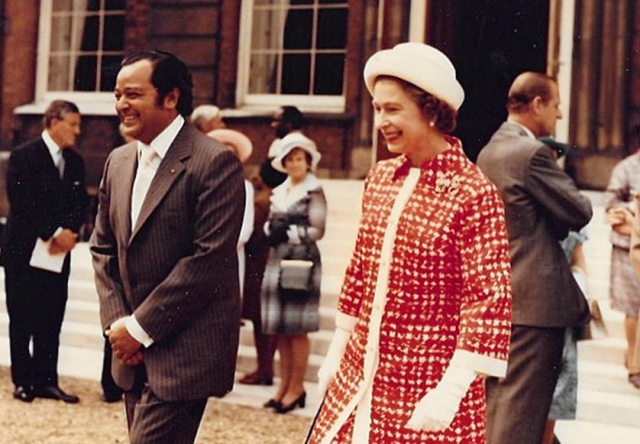 Shridath Ramphal escorting Queen Elizabeth, as Head of the Commonwealth, at his first Commonwealth Day Reception in March 1976 at Marlborough House, London. [photo: Shridath Ramphal public papers online]
Shridath Ramphal escorting Queen Elizabeth, as Head of the Commonwealth, at his first Commonwealth Day Reception in March 1976 at Marlborough House, London. [photo: Shridath Ramphal public papers online]
[This article is from The Round Table: The Commonwealth Journal of International Affairs.]
Memories were in flood as I witnessed from Barbados the BBC’s superb coverage of the Queen’s passing.
As I watched the colourful Proclamation of the new King from the balcony of St. James’s Palace, I seemed to be looking out the window of my former office in London, which overlooked the courtyard. For my office was in what was Queen Mary’s Sitting Room in Marlborough House next door. And why? Because, such was Queen Elizabeth’s caring for the Commonwealth of which she was head, that she gave her grandmother’s home to the Commonwealth as its centre.
On her first Commonwealth Day visit to Marlborough House in 1976, she recalled to me with nostalgia that it was in that home that she and her sister Margaret did their school tutorials.
“Devoted to your service” – 70 years of the Queen as Head of the Commonwealth
Queen Elizabeth II and the Commonwealth: Time to Open the Archives
Tribute to The Queen by Sir Shridath Ramphal
The fact that she had chosen to give to the Commonwealth, the palace in which she had her early learning, was a stirring reminder of the aspirations for the Commonwealth that she espoused on her 21st birthday: ‘If we all go forward together with an unwavering faith, a high courage, and a quiet heart, we shall be able to make of this ancient commonwealth, which we all love so dearly, an even grander thing – more free, more prosperous, more happy and a more powerful influence for good in the world – than it has been in the greatest days of our forefathers’.
She most certainly worked all her life to fulfill that goal.
She had inherited from her father, George VI, not a Commonwealth of allegiance, but one of alliance and affection; and she spent her early years as its Head, sharing with its young leaders, their dreams of a Commonwealth of togetherness. To a young Kenneth Kaunda of Zambia, she was ‘Elizabeth’; an older Nelson Mandela of a free South Africa, he was quickly ‘Nelson’.
The Queen was steadfast in her constitutional duties to Britain and her other realms that stretched across the globe, but she melded them into her determination that, even as many of her realms became Republics, the Commonwealth should remain united in furtherance of its ideals – ideals that she clearly shared. Hence, her steadfastness in resisting the inherent racism on issues such as apartheid in South Africa, and the Unilateral Declaration of Independence by a government in Southern Rhodesia that had denied rights to its majority black population. Hers was a commitment that the Commonwealth treasured, and by which it was enriched.
I remember Michael Manley, Prime Minister of Jamaica in the 1970s, remonstrating with me for not telling him that hosting the Commonwealth Summit involved a ’royal visit’. I was Foreign Minister of Guyana and especially close to Michael; and I had urged him to offer Jamaica as the venue for the 1975 Summit – as he did for a warmly receptive Commonwealth.
On the domestic scene, he was cultivating a radical posture and was troubled that a State visit by the Queen with ‘imperialist’ connotations would be at odds with his political image. I told him that he should not worry. I said the sincerity of The Queen’s commitment to the peoples of the Commonwealth was infectious; the people of Jamaica, of which she was still Queen, would welcome her.
Michael remained uneasy; but, of course, the Queen’s visit was a towering success. She sprinkled stardust everywhere she went, and Michael Manley quickly enjoyed escorting her about Kingston to the applause of rapturous crowds. That was true of the Queen wherever she went in the Commonwealth – whether it was at rodeos in Canada or ‘canoeing’ in Tonga.
Buckingham Palace was inevitably at the centre of the majestic pageantry of the Queen’s passing, but for me there was revived memory of an event in the Palace’s less familiar garden – a memory that stands as one of the Queen’s sterling qualities.
In 1996, Nelson Mandela, then President of South Africa, made a State Visit to Britain as guest of The Queen. By then, eight British universities had invited Mandela to accept honorary degrees. Warwick was one of them; and I was its Chancellor.
Each of the universities sought space for him to attend their Special Convocations. The Queen intervened, proposing a special Degree Ceremony on the lawns of Buckingham Palace where all eight Universities could confer their honorary degrees on her guest. Oxford was one of them; its Council demurred, saying this had never happened in Oxford’s long history.
The Queen’s response was that that was a problem for Oxford; the Special Convocation would proceed on the lawns of the Palace with those Universities that could participate. Oxford discovered that they had found a precedent after all, and participated.
On 10 July 1996, at a once only Special Convocation on the lawns of Buckingham Palace, President Nelson Mandela, Queen Elizabeth’s special guest at the Palace, received Honorary Degrees from the eight British Universities. It was a magnificent spectacle; a galaxy of academic robes in this majestic constellation. It remains, for me, a superior memory of Queen Elizabeth II and her capacity to quietly proffer dignified solutions to what appeared to be intractable problems.
Sir Shridath “Sonny” Ramphal served as Commonwealth Secretary-General from 1975 to 1990.



